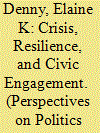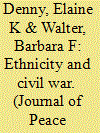|
|
|
Sort Order |
|
|
|
Items / Page
|
|
|
|
|
|
|
| Srl | Item |
| 1 |
ID:
186655


|
|
|
|
|
| Summary/Abstract |
How do economic shocks and financial resilience shape civic engagement, especially for the economically insecure? I turn to the early months of the coronavirus pandemic for insights. In April 2020, with more than 23 million adults unemployed, the US government asked residents to participate in the constitutionally mandated decennial census. I test how variations in income shocks from the shutdown and sources of financial resilience predict disparities in census completion, a civic act designed to minimize participation barriers. First, I use nationally representative survey data to demonstrate that policies that protect the economically vulnerable from the full impacts of economic shocks also predict higher census completion rates. Then, I use Google Trends data to show that high unemployment search volume interacted with low resilience to predict depressed census completion. Findings shed light on how economic crises can widen participation gaps—with representation and resource consequences—and how policies that lessen acute economic shocks may reduce participation disparities.
|
|
|
|
|
|
|
|
|
|
|
|
|
|
|
|
| 2 |
ID:
128867


|
|
|
|
|
| Publication |
2014.
|
| Summary/Abstract |
If a civil war begins, it is more likely to be initiated by an ethnic group than any other type of group. We argue that ethnic groups, on average, are likely to have more grievances against the state, are likely to have an easier time organizing support and mobilizing a movement, and are more likely to face difficult-to-resolve bargaining problems. We further argue that each of these factors was likely due to three pre-existing patterns associated with ethnicity. First, when political power is divided along ethnic lines, ruling elites can disproportionately favor their own ethnic group at the expense of others. This creates grievances that fall along ethnic lines. Second, ethnic groups tend to live together in concentrated spaces, sharing the same language and customs, and enjoying deep ties with ethnic kin. This means that ethnic groups, if they are aggrieved, will have an easier time mobilizing support to demand change. Third, the fact that ethnic identity tends to be less elastic than other types of identity means that credible commitments to any bargain - before and during a conflict- will be more difficult to make. The result is that ethnic groups will have a greater number of reasons, opportunities, and incentives to mobilize and fight than non-ethnic groups.
|
|
|
|
|
|
|
|
|
|
|
|
|
|
|
|
|
|
|
|
|